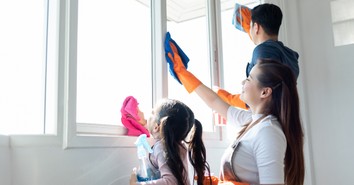How to Grow Your Child's Conscience

Have you ever noticed, some parents think their kids can do no wrong? Others think their children can do no right. Well… there are elements in both statements that have some truth in them.
We are made in God's image. And we have all sinned.
Our kids need parental help and supernatural intervention when it comes to growing a conscience. To keep the moral compass functioning properly, the Holy Spirit must be involved. A conscience without the Holy Spirit will be feelings led.
Without the influence of the Holy Spirit, the we fall back onto emotions to dictate good and bad, right and wrong. The idea of, "It feels right, do it" or "Let your heart tell you what to do" are all statements of an underdeveloped conscience. Oftentimes, doing the right thing doesn't feel good and is inconvenient.
Doing the right thing can come at a cost. One college kid took his computer back to the store to be replaced or repaired. The clerk prompted him by saying the warranty was still valid and it could be exchanged or fixed if, “… you didn’t spill on it” (wink wink). Being a broke college kid, the temptation to lie was looming. Buying a new computer wasn’t in his budget.
“I did spill on it,” he confessed.
“Have it your way,” the baffled clerk responded.
This young man valued honesty more than the cost of a new computer.
So how do we get our kids to the place where they are able to do the right thing even when it is hard?
We start with ourselves. We model doing the right thing even when there is a cost like: lost time, money, or convenience. As we show, we also tell. Talk about why doing the right thing is right. Discuss the hard choices.
“I just realized the cashier did not charge me for the bottle of shampoo. I need to drive back to the store to get this adjusted. My integrity is worth more than a bottle of shampoo.”
Modeling honesty and being a promise keeper are two ways parents can impact the development of their child’s conscience.
Trust is built when parents are true to their word. When we tell our kids we promise to take them to the park, fulfilling that promise shows the child mom and dad are trustworthy.
Conscience building is a process. It is helpful to understand the six stages so we can assist our kids as they move through the various phases.
1. Infancy: If it hurts, it's bad. “Being hungry is bad because it hurts.” With babies, this is the time to build trust by responding to their needs. If one is spiritually in the infant stage he may say, "Because it feels so good when I'm with you, I know it's okay to have sex with you." The conscience in this case is emotion driven. It's right if it feels right.
2. Toddler: "Hitting is bad because I get into trouble." Behavior is good or bad depending on the consequence. With toddlers this is the time to establish acceptable and unacceptable behavior, rules and consequences. An adult in the toddler stage of conscience development may say, "I won't have sex with you because you could get pregnant." This stage is obedience driven. It's right if it's the rule.
3. Preschool to seven years old: "It's wrong because my family doesn't do it that way." With this age group this is the time to talk about "Team ____(last name)” and establish family unity and identity. The do unto others Golden Rule can be applied at this phase. This is the age of "Why" and the perfect time to begin in earnest talking about family values, morals, and faith. An adult at this spiritual phase may say, "I go to church because that is what people in my family do." (For those kids who have failed to connect they bounce back to stage 2 - the toddler level - and say, "If I do it and don't get caught it's okay.) Conscience is tradition driven. It's right because that's how I was raised.
4. Ages seven to ten: At this stage kids realize mom and dad are not perfect. They are keenly aware of fairness. "That's not fair." With the intermediate age group this a great time to say, "I'll do this, if you do that" establishing more family responsibility and reciprocity. Spiritually speaking, someone at this phase may say, "Why does this happen to me God when I do this for you?" Shoulds and shouldn'ts are evident in this person's vocabulary. A "What's in it for me, tit-for-tat" mentality. This level is fairness driven. It's right if it's fair.
5. Preteen-teen: Peer pressure, peer values. "Kids my age always _____ That's what we do." People pleasing can also be a part of this phase. "I will do____ to be accepted." In this phase it is good to ask questions to get kids thinking. We want our kids to evaluate their decisions and recognize if they are making are solid choices or peer pressure driven ones. This stage is driven by the culture. It's right if the culture says it is.
6. A healthy mature moral compass is one where thinking, feeling, and acting with empathy, compassion, and doing the good and right thing (just because it is good and right) occur. The right thinking, feeling, and action occur in spite of good or bad feelings, rules (laws), tradition, fairness, or society. God and His Word set the moral standard of right and wrong. It's right because God says it's right.
To reach stage six we begin by letting our kids know they are loved by us and by God unconditionally. Our kids must believe they were created on purpose for a purpose. They are valuable and important. They need the knowledge that God's word helps us all live well.
When kindness and respect are demonstrated in our homes, empathy can be fostered. Empathy is a critical component of conscience development. Experience is the best teacher. It’s okay to allow our kids to feel disappointment without feeling shame. Shame actually hinders conscience development. Grace, truth, and empathy are the qualities that build a sense of right and wrong.
By listening to our kids, responding to their needs, building trust, setting limits, following through with consequences, teaching responsibility, not allowing for aggressive talk or actions, while avoiding rescuing them from sadness, discomfort, or failure, we can influence healthy conscience development.
When we train our kids to live for the audience of one, they are free to make decisions that may be counter-cultural, which, in this politically correct society, is a courageous thing to do. When they look to God rather than man they will be more able to hear His voice over the dull roar of the masses.
By helping our kids grow a Holy Spirit driven conscience they will be mature, wise, loving, and discerning people who honor God with their thoughts, words, and deeds.
My conscience confirms it through the Holy Spirit. (Romans 9:1)
For more information on conscience development or teen temptations go to Amazon or to the 1 Corinthians 13 Parenting Store and pick up your copy of Raising Little Kids with Big Love (toddler- nine) or Raising Big Kids with Supernatural Love (tween-young adult).
Lori Wildenberg is a licensed parent-family educator, co-author of three parenting books, and co-founder of 1 Corinthians 13 Parenting. Contact Lori to schedule her for a seminar, retreat, or speaking event. Go to www.loriwildenberg.blogspot.com to subscribe to Lori’s Eternal Moments blog.
Publication date: August 22, 2016
Originally published September 24, 2018.





